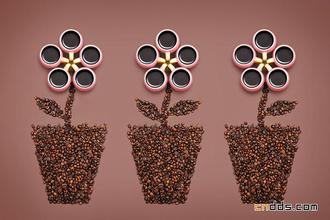Introduction to high-quality coffee with strong flavor and taste characteristics of Gan Manor in Kahayang, Indonesia
Manning's leaping micro-acid mixes with the richest fragrance, making your body relaxed.
When it comes to the lively factor in the mild fragrance, its outstanding taste captivates many suitors. In the 17th century, the Dutch introduced Arabica seedlings to Ceylon (present-day Sri Lanka) and Indonesia. In 1877, a large-scale disaster hit the Indonesian islands, coffee rust destroyed almost all the coffee trees, people had to give up Arabica, which had been in operation for many years, and introduced the disease-resistant Robusta coffee tree from Africa. Indonesia today is a big coffee producer. Coffee is mainly produced in Java, Sumatra and Sulawi, with Robusta accounting for 90% of the total production. Sumatra Manning is a rare Arabica species. These trees are planted on hillsides between 750m and 1500 meters above sea level, mysterious and unique Sumatra, giving Mantenin coffee, rich aroma, rich taste, strong flavor. Make it unique, with a hint of chocolate and syrup.
Mantenin coffee beans have large granules and hard beans, and they are prone to defects in the process of planting. After harvest, they are usually subject to strict manual selection. If the control process is not strict enough, it is easy to cause a mixture of good and bad quality. in addition, the different degree of baking will also directly affect the taste, so it has become a more controversial single product. Mantenin has a strong taste, with a strong mellow and rich and lively sense of movement, neither astringent nor sour, mellow and bitter can be fully revealed. The appearance of Mantenin coffee beans can be said to be the ugliest, but coffee fans say that the worse the Sumatran coffee beans are, the better, mellow and slippery the coffee is.
Manning Coffee is produced in Sumatra, Indonesia, Asia, also known as "Sumatran Coffee". The main producing areas are Java, Sulawesi and Sumatra, 90% of which are Robusta species. Among them, the "Mantelin" produced in Sumatra is the most famous. The best of the exquisite traditional Arabica coffee produced in northern Sumatra of Sumatra is sold as Lindong Lintong and Manning Mandheling. To be exact, Lindong Lintong refers to coffee growing in a small area in the southwest of Lake Toba in Lindong District. The small coffee growing area is scattered on a high and wavy clay plateau full of fern covers. Lintong Lindong Coffee is grown without shade, does not use chemicals, and is almost entirely owned by small private owners. Mandheling manning is a broader term that includes Lintong Lindong Coffee and similar conditions of Diari [capital Sidikalang], Lake Toba growing area north of some islands in Indonesia, such as Java, Sumatra, Bali, Sulawesi, where Kopi Luwak is a traditional specialty. The civet only contains this unique coffee in its feces after eating local coffee cherries. In fact, the official name of Kopi Luwak is Kopi Luwak. Kopi means "coffee" in Indonesian, while Luwak is a wild civet in Indonesia.
Sheng Zhen, a staff member of the Indonesian Pavilion, said that in order to get precious "cat poop coffee beans," local farmers in Indonesia would put civets into cages to feed themselves, and some coffee merchants simply packed an island to keep these cats. Let them enjoy the natural environment of sunshine and rain. "the civets eat and pull by themselves, and you can't force them to eat or pull, so the coffee beans in the excrement are very precious!" It is reported that this rare coffee produces only 500 pounds a year. The raw materials of this kind of coffee are difficult to obtain, and the production process is very complicated, and it must go through strict sanitary procedures, such as drying, roasting, brewing and so on. However, the final coffee will produce a unique aroma, so it is very expensive
The distillation process of Kopi Luwak was demonstrated at the scene. "12 grams of Kopi Luwak, distilled with 50 to 55 grams of water, so that the final coffee is the most mellow." The coffee grounds left by Kopi Luwak are also very unique, smooth and without holes, which ordinary coffee can't do.

Important Notice :
前街咖啡 FrontStreet Coffee has moved to new addredd:
FrontStreet Coffee Address: 315,Donghua East Road,GuangZhou
Tel:020 38364473
- Prev

An introduction to the coffee flavor and taste area of Burman Manor in Kenya.
Kenyan coffee is mostly grown at an altitude of 1500m, 2100m, and is harvested twice a year. To ensure that only ripe berries are picked, people must tour the forest about seven times. Kenyan coffee is grown by small farmers. After they harvest the coffee, they first send the fresh coffee beans to the cooperative cleaning station, where the washed and dried coffee is covered with parchment beans.
- Next

Introduction of coffee flavor and taste characteristics of Santa Barara Manor in Honduras with slight floral aroma
Honduras declared its independence on September 15, 1821, but was incorporated into the first Mexican Empire in 1822. He joined the Central American Union in 1823 and withdrew from the Central American Union in October 1838 to establish a republic. In 1840, with the support of Guatemalan dictator Rafael Carrera, conservative Francisco Ferreira established a dictatorship. After 1853, freedom in Honduras
Related
- Does Rose Summer choose Blue, Green or Red? Detailed explanation of Rose Summer Coffee plots and Classification in Panamanian Jade Manor
- What is the difference between the origin, producing area, processing plant, cooperative and manor of coffee beans?
- How fine does the espresso powder fit? how to grind the espresso?
- Sca coffee roasting degree color card coffee roasting degree 8 roasting color values what do you mean?
- The practice of lattes: how to make lattes at home
- Introduction to Indonesian Fine Coffee beans-- Java Coffee producing area of Indonesian Arabica Coffee
- How much will the flavor of light and medium roasted rose summer be expressed? What baking level is rose summer suitable for?
- Introduction to the characteristics of washing, sun-drying or wet-planing coffee commonly used in Mantenin, Indonesia
- Price characteristics of Arabica Coffee Bean Starbucks introduction to Manning Coffee Bean Taste producing area Variety Manor
- What is the authentic Yega flavor? What are the flavor characteristics of the really excellent Yejasuffi coffee beans?

